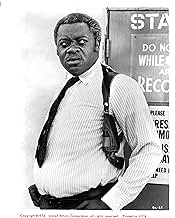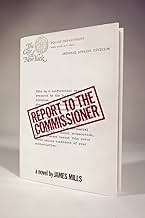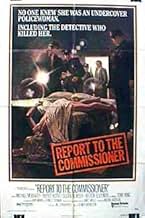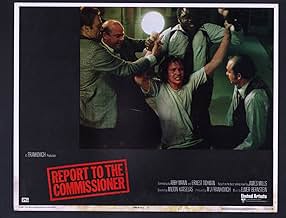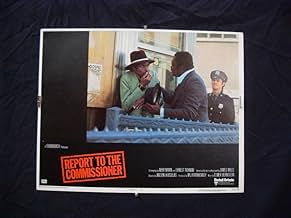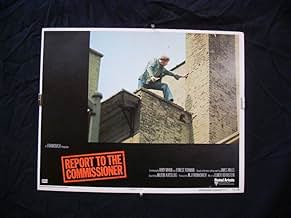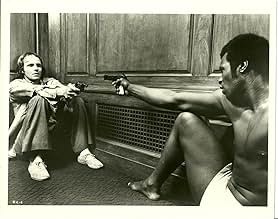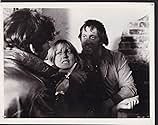IMDb RATING
6.7/10
1.4K
YOUR RATING
Politics skew the probe of a rookie detective's accidental shooting of an undercover policewoman.Politics skew the probe of a rookie detective's accidental shooting of an undercover policewoman.Politics skew the probe of a rookie detective's accidental shooting of an undercover policewoman.
- Director
- Writers
- Stars
- Awards
- 2 nominations total
Bob Balaban
- Joey Egan
- (as Robert Balaban)
Bebe Drake
- Dorothy
- (as Bebe Drake Hooks)
- Director
- Writers
- All cast & crew
- Production, box office & more at IMDbPro
Featured reviews
I was one of the many bystanders who witnessed part of the major scene which took place on location in front of and inside Sak's 5th Avenue in Manhattan, a lunch hour that turned into two. I believe it was based on a true event and is documented in the NYPD files.As for the movie it was one of the best and well acted movies of the seventies in my opinion. I have been trying to get a copy of it for years.The movies involves a screw-up that leaves a female undercover cop dead because the brass feel asleep and later looked for and found a scapegoat, sound familiar? As I mentioned the acting was great, all of the cast acted as if they been NY City cops at some point in their lives.
Report to the Commissioner is a film about a misfit detective who does not heed the warning of his senior partner and gets himself into one beautiful jackpot as Andy Sipowicz would put it. It's an underrated classic film from the seventies with an interesting cast and a lot of good performances.
Abby Mann wrote the original screenplay of Report to the Commissioner and Mann who is famous for writing Judgement at Nuremberg also is the creator of that classic police series Kojak from the seventies. The film does have a Kojak feel to it. Shooting the thing entirely on location in New York really helps with the believability of the plot.
Michael Moriarty plays a young and very naive detective assigned to what looks to be the Midtown North Precinct in Manhattan. He comes from a police family and he's assigned to partner with Yaphett Kotto who worked with Moriarty's father.
At the same time Susan Blakely is a young, fresh faced, but most experienced detective whose all American good looks fool a lot of perpetrators. She decides to get close to a big time drug dealer played by Tony King to get the goods on him.
To make her cover as a runaway sound feasible, higher up captain Hector Elizondo has Moriarty make some routine inquiries looking for Blakely under her street name of Chicklet. The only problem is that Moriarty takes the assignment way too seriously, earnestly trying to win respect among his peers. It results in tragedy all around.
The cast is really finely tuned in this film. Especially Elizondo who will chill you with his attitude. He turns in a fine performance as a bureaucratic cop real good at department politics, but a real snake as a human being.
In one of his earliest roles is William Devane who has only one scene in the film questioning Moriarty about what's happened. Devane's a hotshot Assistant District Attorney who's practically salivating over a homicide conviction, another scalp for his lodgepole so to speak. You will remember him.
Report to the Commissioner is a nice look at the Seventies in New York and a great police drama. You will agree that Yaphett Kotto gave Moriarty the best advice about knowing the players in a given situation.
Abby Mann wrote the original screenplay of Report to the Commissioner and Mann who is famous for writing Judgement at Nuremberg also is the creator of that classic police series Kojak from the seventies. The film does have a Kojak feel to it. Shooting the thing entirely on location in New York really helps with the believability of the plot.
Michael Moriarty plays a young and very naive detective assigned to what looks to be the Midtown North Precinct in Manhattan. He comes from a police family and he's assigned to partner with Yaphett Kotto who worked with Moriarty's father.
At the same time Susan Blakely is a young, fresh faced, but most experienced detective whose all American good looks fool a lot of perpetrators. She decides to get close to a big time drug dealer played by Tony King to get the goods on him.
To make her cover as a runaway sound feasible, higher up captain Hector Elizondo has Moriarty make some routine inquiries looking for Blakely under her street name of Chicklet. The only problem is that Moriarty takes the assignment way too seriously, earnestly trying to win respect among his peers. It results in tragedy all around.
The cast is really finely tuned in this film. Especially Elizondo who will chill you with his attitude. He turns in a fine performance as a bureaucratic cop real good at department politics, but a real snake as a human being.
In one of his earliest roles is William Devane who has only one scene in the film questioning Moriarty about what's happened. Devane's a hotshot Assistant District Attorney who's practically salivating over a homicide conviction, another scalp for his lodgepole so to speak. You will remember him.
Report to the Commissioner is a nice look at the Seventies in New York and a great police drama. You will agree that Yaphett Kotto gave Moriarty the best advice about knowing the players in a given situation.
Okay, so there aren't enough reviews praising this? So, I will write one. It is not so much that this film is underrated, it deserves the place it has, in the unvarnished uniqueness of post French Connection New York films greenlit because Connection won best picture. This picture is interesting because in the middle of all the crime stuff, it's center is really a chewy for relationships (the kind that guys write after watching 'The Dirty Dozen' or 'Serpico' 20 times), and it is that dark center of distrust with it's dangerous home truths that provides the engine of drama.
Ever feel like that's all life is -- police stories? This one will fuel you're suspicions, if you allow yourself to go along with it (which is hard to do), but that's what New York dark cinema is supposed to do.
But see it to celebrate Susan Blakely, with 'Rich Man Poor Man' as the second part of the double bill. She has her place as a TV queen but before that she also did some very nice work large screen and showed real promise with this pic. The wardrobe, the Tidyman script, the Tosi cinematography in New York, and with the tortured performance of Moriarty there you have it. It is not a satisfying film, that is why the reactions, but it isn't supposed to be. "Report to the Commissioner" happens every day here, ask James Mills who wrote it, he has since discovered it happens all over the world.
Watch 'The Way We Were' after to see Blakely just coming on the scene, if this one is too dark for you, or, 'Who'll Stop the Rain' to see Moriarty.
Ever feel like that's all life is -- police stories? This one will fuel you're suspicions, if you allow yourself to go along with it (which is hard to do), but that's what New York dark cinema is supposed to do.
But see it to celebrate Susan Blakely, with 'Rich Man Poor Man' as the second part of the double bill. She has her place as a TV queen but before that she also did some very nice work large screen and showed real promise with this pic. The wardrobe, the Tidyman script, the Tosi cinematography in New York, and with the tortured performance of Moriarty there you have it. It is not a satisfying film, that is why the reactions, but it isn't supposed to be. "Report to the Commissioner" happens every day here, ask James Mills who wrote it, he has since discovered it happens all over the world.
Watch 'The Way We Were' after to see Blakely just coming on the scene, if this one is too dark for you, or, 'Who'll Stop the Rain' to see Moriarty.
The 70s were definitely a great time for cinema, giving us gritty NYC thrillers and dramas like "Across 110th Street", "Serpico", "The French Connection", and "Dog Day Afternoon". "Report to the Commissioner", based on the novel by James Mills, can join those ranks, with its matter of fact, semi-documentary approach. Its characters are vivid and convincing, and the performances memorable. The story allows for some tense scenarios, and offers an interesting look into departmental politics within the police department, and how this sort of thing can create its share of victims.
Michael Moriarty stars as Beauregard "Bo" Lockley, a hippie-ish rookie detective on the police force who's overwhelmingly naive. He's partnered with the hard-boiled veteran Richard "Crunch" Blackstone (Yaphet Kotto), and gets a little taste of the street life. His own "doing good" mentality gets him into a lot of trouble when he ends up shooting Patty Butler (Susan Blakely), a beautiful young detective working deep undercover. She'd made the bold decision to move in with a drug pusher, Thomas "Stick" Henderson (Tony King) to get the goods on him, and Lockley had been fed a line of bull about her identity in order to make the whole thing look good. Now the NYPD has to decide what to do with this mess, and how much to tell the commissioner (Stephen Elliott).
For this viewer, the only real debit was Moriarty. Sometimes his eccentricities can benefit a movie (ex: his hilarious performance in "Q: The Winged Serpent"), but here, he's just too whiny and mannered to make his character as sympathetic as he should be. Fortunately, there's lots of heavy hitters here to pick up the slack: Kotto, Blakely, Hector Elizondo, Michael McGuire, Dana Elcar, Bob Balaban, William Devane, Elliott, Vic Tayback. And it's cool to see a young Richard Gere making his film debut as Billy the pimp. Real life NYC detectives Sonny Grosso and Albert Seedman have small roles.
Some of the story is played out in the form of interviews, helping us to get insight into character motivations. There's one damn entertaining, and lengthy, foot chase, which also delivers beefcake for the audience because the studly King is running around wearing little. The entire sequence on the elevator is riveting, especially since we definitely get a sense of how hot it must be in there for Moriarty and King. And Balaban figures in what has to be one of the most original "tailing" sequences seen on film. The location shooting (cinematography by Mario Tosi) is excellent, and Elmer Bernstein supplies a sometimes unusual but generally effective music score.
This one is well worth catching for fans of the actors and lovers of 70s cinema.
Eight out of 10.
Michael Moriarty stars as Beauregard "Bo" Lockley, a hippie-ish rookie detective on the police force who's overwhelmingly naive. He's partnered with the hard-boiled veteran Richard "Crunch" Blackstone (Yaphet Kotto), and gets a little taste of the street life. His own "doing good" mentality gets him into a lot of trouble when he ends up shooting Patty Butler (Susan Blakely), a beautiful young detective working deep undercover. She'd made the bold decision to move in with a drug pusher, Thomas "Stick" Henderson (Tony King) to get the goods on him, and Lockley had been fed a line of bull about her identity in order to make the whole thing look good. Now the NYPD has to decide what to do with this mess, and how much to tell the commissioner (Stephen Elliott).
For this viewer, the only real debit was Moriarty. Sometimes his eccentricities can benefit a movie (ex: his hilarious performance in "Q: The Winged Serpent"), but here, he's just too whiny and mannered to make his character as sympathetic as he should be. Fortunately, there's lots of heavy hitters here to pick up the slack: Kotto, Blakely, Hector Elizondo, Michael McGuire, Dana Elcar, Bob Balaban, William Devane, Elliott, Vic Tayback. And it's cool to see a young Richard Gere making his film debut as Billy the pimp. Real life NYC detectives Sonny Grosso and Albert Seedman have small roles.
Some of the story is played out in the form of interviews, helping us to get insight into character motivations. There's one damn entertaining, and lengthy, foot chase, which also delivers beefcake for the audience because the studly King is running around wearing little. The entire sequence on the elevator is riveting, especially since we definitely get a sense of how hot it must be in there for Moriarty and King. And Balaban figures in what has to be one of the most original "tailing" sequences seen on film. The location shooting (cinematography by Mario Tosi) is excellent, and Elmer Bernstein supplies a sometimes unusual but generally effective music score.
This one is well worth catching for fans of the actors and lovers of 70s cinema.
Eight out of 10.
Here we have yet ANOTHER case of an extremely underrated film. is everyone out of their minds?? Whats with all the mediocre reviews/comments? And here we go with the "it isn't as good as the book" comments. I thought I cleared that up when I reviewed "Slaughterhouse Five" A great cast in a fascinating gritty 70's crime thriller, VISUALLY much in the vein of French Connection, Taking of Pelham 1,2 3 or Panic in Needle Park. The sequence with Bob Balaban as the maniac amputee was brilliant, Susan Blakely is beautiful, story is fascinating. Thank god I had the chance to see this on film (as a pristine 16mm print) I'm looking forward to seeing the 2nd reel.
Did you know
- TriviaFirst film of Richard Gere.
- GoofsWhen Michael Moriarty is chasing Tony King through the street, at first King is barefoot, but at certain instances, you can tell he has on shoes, then later in the chase scene, he is barefoot again.
- Quotes
Richard 'Crunch' Blackstone: [laughing] It happened. They sent us a hippy.
- SoundtracksLoving You Gets Better With Time
Written by Vernon Burch, Spencer Proffer, Jeffrey Marmelzat
Performed by Vernon Burch
- How long is Report to the Commissioner?Powered by Alexa
Details
- Release date
- Country of origin
- Language
- Also known as
- Investigación peligrosa
- Filming locations
- 625 8th Avenue, Manhattan, New York City, New York, USA(Crunch smacks around a pimp with the Port Authority Bus Terminal in the background)
- Production company
- See more company credits at IMDbPro
Contribute to this page
Suggest an edit or add missing content


